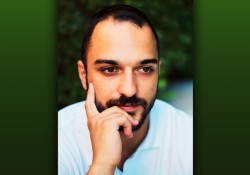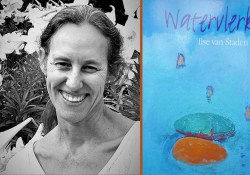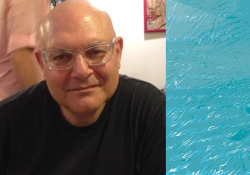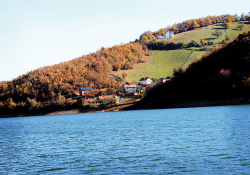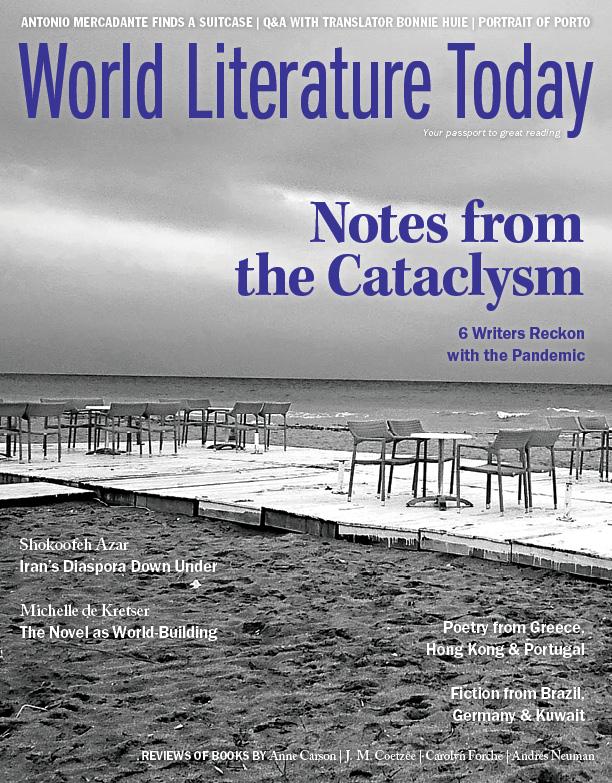Desegregating Language: The New Afrikaans Crime Novel

Encountering postapartheid Afrikaans fiction for the first time, particularly the fast-paced crime novels of Deon Meyer, the author finds that the most unexpected element is the new lack of segregation between Afrikaans and English.
Since the end of South Africa’s apartheid regime in 1994, there has been an unexpected boom in crime fiction written in Afrikaans. South Africa of the 1970s and ’80s, under a totalitarian, nationalist government, was not a country in which police officers and crime investigators could be portrayed as sympathetic protagonists. As Deon Meyer, the only internationally best-selling Afrikaans crime-fiction writer, remarked in South Africa’s Mail & Guardian: “It is very difficult to have a cop as a hero if he works for an evil regime. You don’t tend to find crime thrillers in any community where a ‘non-democratic’ situation prevails.”1
Also unthinkable in the era of apartheid would have been a proliferation of cop duos pairing a black investigator with a white one, as is now common in South African crime novels, or a white officer and one of mixed race, with the white officer often the lower-ranking partner. Except for Meyer’s books, which have been translated into twenty-seven languages, much of this Afrikaans crime fiction—a best-selling phenomenon within South Africa—has remained untranslated.
Except for Deon Meyer’s books, much of this Afrikaans crime fiction has remained untranslated.
I first read about Deon Meyer in an enthusiastic Guardian article by the South African expatriate Matthew Lewin, who in 2007 had just returned to South Africa for the first time since the apartheid government had fallen. There, to his surprise, he discovered what he called the new Afrikaners: “At a restaurant in Cape Town we heard the people at the next table speaking in Afrikaans, and I made a profound discovery: I didn’t have to hate these people anymore. They were no longer the oppressors, the political dinosaurs, the bigoted racists that I had known before my flight to England. On the contrary, they were now the chief agents of change, the people who saw the writing on the wall, understood the words and acted on them.”2
Encouraged by Lewin’s experience, I felt it was time that I also undertook a journey back: not to South Africa (where I have never been), but to the Afrikaans language that had preoccupied my high school years. I encountered Afrikaans as a teenager in an unconventional way. It was in the late 1970s at an international high school in Greece, some five thousand miles from South Africa as the crow flies. The deadly 1976 Soweto uprising and the ensuing turmoil had led many Afrikaners of Greek origin to abruptly leave South Africa and return to Greece, and several dozen Greek Afrikaner teenagers ended up at our school in Athens. Afrikaans was hip, you heard it in the classrooms and hallways, and soon Ordinary Level and Advanced Level examinations in Afrikaans were in the curriculum. As I knew German well (it is my mother tongue) and had studied Dutch, Afrikaans sounded pleasantly familiar: a melodious and intriguing language reminiscent of Dutch, yet so different, with its own marked characteristics, a language that had dropped complicated verb endings and grammatical gender. I learned that it was a new language—the newest language in the world, people said—and that it had been born when Dutch colonizers settled among the Khoekhoe speakers of the Cape in the seventeenth century. It was a language that even its speakers maligned as Hottentot Dutch and Kitchen Dutch, an unruly patois that, against all odds, then rose to become one of South Africa’s official languages.

Some of the most vocal opponents of apartheid were speakers of Afrikaans.
By a twist of fate, the Soweto uprising that had brought the Greek Afrikaners back to Greece in the late 1970s had been all about the Afrikaans language. The uprising had been triggered by a new “Afrikaans First” policy that ordered schools in the segregated, all-black South African townships to teach most of the main subjects in Afrikaans, the language that Desmond Tutu had proclaimed to be “the language of the oppressor.” Afrikaans, the first language of some six million South Africans of various racial backgrounds, had been hijacked by the white Afrikaner nationalist minority and had become a hated symbol of white supremacy and nationalist Afrikanerdom. And yet, according to the 2001 South African Census, the largest group of Afrikaans mother-tongue speakers—3,173,972 in number—were in fact of mixed race, while there were only 2,536,906 white South Africans who spoke it as a first language. Indeed, some of the most vocal opponents of apartheid were speakers of Afrikaans. Nakedi Mathews Phosa, for instance, the former premier of Mpumalanga and a long-standing member of the African National Congress, is a poet who writes in Afrikaans. Nevertheless, Afrikaans and white-nationalist apartheid came to be seen as inextricably linked, one serving as a symbol of the other.
The schoolbooks we had for our Afrikaans-language classes in Greece in the 1970s had been published in South Africa under the watchful eye of the apartheid censor, and one of the tasks of the censor was to see to it that there was also an apartheid, a clear-cut segregation, between Afrikaans and its perceived archenemy, the English language. No English words were allowed in Afrikaans speech and writing, and definitely no anglicisms, which were considered particularly insidious. They were called versluierde onsuiwerhede, “veiled impurities,” corroding Afrikaans from the inside. A significant portion of each exam was dedicated to language purity. We had to seek out and neutralize anglicisms, replacing them with suiwer Afrikaans, “clean Afrikaans.” This exam section was playfully (or perhaps not so playfully) called “Boobytraps,” and points were taken off if you failed to spot the foreign intruder.
One of the tasks of the censor was to see to it that there was also an apartheid, a clear-cut segregation, between Afrikaans and its perceived archenemy, the English language.
 Encountering postapartheid Afrikaans fiction for the first time, particularly the fast-paced crime novels of Deon Meyer, I found that the most unexpected element was the new lack of segregation between Afrikaans and English. What the Afrikaner nationalists of the apartheid state had feared most has come to pass—and on a surprising scale. English words abound, and characters in the novels flip freely from Afrikaans to English and back again. Meyer is a master of reproducing Kaaps, the slangy Cape Town Afrikaans dialect that is mainly spoken by people of multiracial background. It is a slang that readily welcomes English words. Police Captain Vaughn Cupido, who appears in several of Meyer’s novels, speaks in fluid, snappy Kaaps. In Cobra (2013), we hear him say:
Encountering postapartheid Afrikaans fiction for the first time, particularly the fast-paced crime novels of Deon Meyer, I found that the most unexpected element was the new lack of segregation between Afrikaans and English. What the Afrikaner nationalists of the apartheid state had feared most has come to pass—and on a surprising scale. English words abound, and characters in the novels flip freely from Afrikaans to English and back again. Meyer is a master of reproducing Kaaps, the slangy Cape Town Afrikaans dialect that is mainly spoken by people of multiracial background. It is a slang that readily welcomes English words. Police Captain Vaughn Cupido, who appears in several of Meyer’s novels, speaks in fluid, snappy Kaaps. In Cobra (2013), we hear him say:
“So let me get this straight,” sê Cupido. “Al wat jy weet, is lat hierdie ou ’n Brit is met ’n fancy aksent en seventy thousand to burn. No address, no job description, niks. For all we know kan hy ’n serial killer wees.”
Can one translate this mixed speech into English? K. L. Seegers’s valiant attempt:
“So let me get this straight,” said Cupido. “All that you know, is that this ou is a Brit with a fancy accent and seventy thousand to burn. No address, no job description, nada. For all we know he could be a serial killer.”
(Interestingly, Seegers has kept one Afrikaans word, ou—“guy”—and added the Spanish word nada for the Afrikaans niks.)
A reader surprised by the passages of mixed Afrikaans and English in Meyer’s Afrikaans novels may be outright amazed to encounter entire pages of dialogue in English, with only the reporting verbs remaining in Afrikaans:
“What time?” vra Cupido. [Cupido asks]
“At exactly nine o’clock.”
“How do you know that?”
“That was our agreement with them.”
“The bodyguards?”
“Yes. Breakfast at exactly eight o’clock, house cleaning at nine, lunch at one . . .”
Can we imagine a German or French novel with large sections of English dialogue? Or perhaps an American crime writer, such as Don Winslow, having his Mexican characters speak Spanish on the page? In South Africa, however, Afrikaans speakers find themselves surrounded by English media and speakers of English. English is an enormous part of everyday life, and if a writer such as Deon Meyer is to create a realistic scene, then characters who would speak English in real life speak English on the page. And Meyer is not the only writer who puts this insight into practice. As the Afrikaans mystery writer and translator François Bloemhof said in an interview with Mike Nicol—a best-selling South African crime fiction author who writes in English—about translating a story of Nicol’s into Afrikaans: “One quarter of it was darned easy to translate seeing as I kept the dialogue in English.”3
If the brave new directions in Afrikaans writing are exhilarating and liberating, one does wonder what the abundant and diverse presence of English might mean for the future of the language. The Académie Française, the august watchdog of French linguistic purity, publishes regular warnings in its online column Dire, ne pas dire (To say or not to say) about French being in danger of a catastrophic English invasion; what then are the prospects for Afrikaans, a smaller and more marginalized language? I find great reason for optimism in the very fact that a new generation of Afrikaans writers seem exuberantly unthreatened by English and by new varieties of mixed Afrikaans that are reminiscent of American Spanglish in their energy and lexical creativity. Emerging from a history of bitter and impoverishing segregation, Afrikaans literature, like the Afrikaans language itself, is moving into a daring new era filled with linguistic possibilities.
University of Connecticut
1 Yolandi Groenewald, “A Thrill in Every Language,” Mail & Guardian, August 10, 2007.
2 Matthew Lewin, “Bring Me My Assegai,” The Guardian, July 20, 2007.
3 Mike Nicol, “Crime Beat: François Bloemhof Talks about Compiling Donker Plekke,” Sunday Times Books Live, October 31, 2011.

